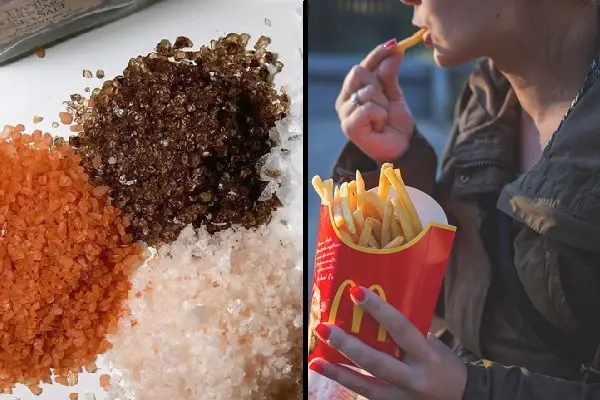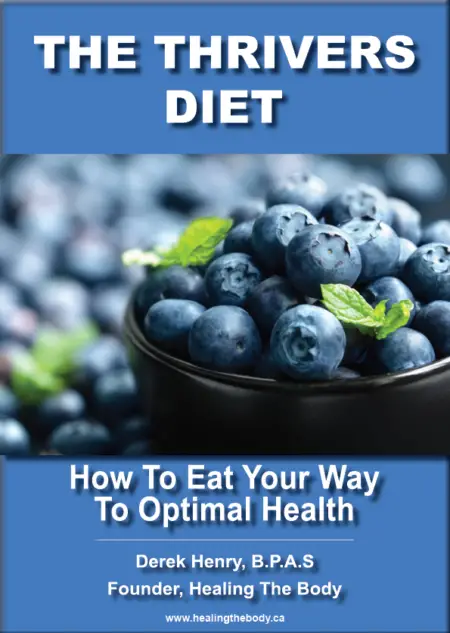
Photo via Jim Noelker/AP
It goes without saying, but food cravings are a pitfall for many diets, healthy lifestyles, and people battling food addictions.
We usually know better than to reach for these foods, but giving in to these cravings is extremely common — and it usually happens because people don’t know which foods their bodies are actually craving.
One study found that 97% of women and 68% of men experience a strong urge to consume particular foods that may not be the healthiest for them. On average, this happens twice a week but can happen far more often due to stress.
There are many reasons for these cravings, and different cultures cave in to different junk foods – some healthier than others. Chocolate, for example, is the number one craved food in North America, while people in Japan are most likely to crave sushi.
But if foods like these are so bad for us (usually because of low quality ingredients), why do we keep eating them so much?
Research shows that the symptoms we experience after eating too much of something unhealthy is not due to the amount of food. It is the body giving you signals that what you ate was not what you needed (or maybe the opposite of what you needed in some cases).
A growing amount of research points to our gut microbes as being the driving force behind this warning system. Understanding this could be the key to getting your health (and your weight for that matter) under control.
The Gut “Brain” and Food Cravings
The gut acts as a mini-brain, which contains some of the same transmitters as your actual brain. Its neurons also form a network called the enteric nervous system, which communicates with the brain back-and-forth.
This communication plays a huge in role in how and what we eat. For example, some nerve blockages in the gut can trigger overeating, because the brain will no longer receive the signal from the gut telling it that it had enough food.
It’s not just about the cravings, however — your gut microbiota is a big deal. About 90% of all of our cells are bacterial, and now science is finding out that a healthy gut prevents the majority of diseases, while a sick gut causes illness.
This has been long established, but the connection between cravings and gut bacteria is new and growing.
Sugar Cravings and a Broken Gut
When it comes to sweets cravings, candida plays a huge role, and getting this ever-present fungus under control by not giving in to your cravings could be the difference between sickness and health.
One study showed that even mice who were bred in a germ-free environment want sweet treats; living germ-free did not allow the mice to create beneficial, needed gut bacteria, however.
When that happens, the gut flora becomes out of balance, and “bad” bacteria such as the candida yeast thrives. Eating processed sugar literally feeds candida, and the body craves more of it.
Candida is present even in a healthy gut, but it is in constant battle with the gut’s good bacteria. The problem appears when candida “wins.” The body then goes into an acidic state and becomes ridden with inflammation.
All of this causes the body to crave sweets, breads, fruit, and starchy vegetables. After the gut becomes unbalanced due to candida overgrowth, the next negative phase is a weakened immune system and nutritional deficiencies.
The damaged gut can no longer absorb all of the nutrients, which is often referred to as a leaky gut. A leaky gut allows food, toxins and bacteria to seep through the walls into the blood stream, leading to many uncomfortable symptoms:
- Infections
- Allergies
- Brain fog
- Bloating
- Join pain
- Caffeine cravings
- Constant hunger
- Low energy
When You Are Craving Sugars and Sweets
Because a damaged gut causes sugar cravings, as discussed above, to fight against these cravings, one has to bring balance to their gut.
To achieve this, good bacteria must be reintroduced into the body. This can be done by:
- Eating cultured vegetables (making your own raw fermented vegetables is easy)
- Taking probiotics
- Avoiding sweets
- Avoiding gut irritants: wheat gluten and milk casein
- Taking an amino acid called glutamine to heal the gut (can be taken in a nutritional blend with enzymes)

PHOTO: Pixabay
Craving unhealthy foods may also a sign of nutritional deficiencies, as passed through the gut-brain communication. The following are simple swaps you can make if you’re craving any of these junk foods or drinks:
What To Do If You’re: Craving Soda
Have you ever woken up in the middle of the night just to put a merciful end to an incessant soda craving?
What draws most people into these drinks is the “buzz” provided by caffeine and sugar. Sugar, of course, is linked to candida overgrowth. However, there is another reason for craving carbonated drinks and that is a possible calcium deficiency.
Ironically, soda depletes calcium and other minerals further. Instead, try eating greens, broccoli, kale, legumes, and sesame seeds – all good plant-based sources of calcium.
 What To Do If You’re Craving: Chocolate
What To Do If You’re Craving: Chocolate
When a person is craving chocolate, besides the sugar in it, it can be a sign of magnesium deficiency.
What depletes this mineral is drinking too much coffee, tea, or alcohol. Getting magnesium from chocolate is possible, especially if eating very dark chocolate – over 75% of cocoa. But it is easier to instead get from Brazil nuts, and also leafy greens, and pumpkin seeds. When severely deficient, it is recommended to consider a magnesium supplement.
What To Do If You’re Craving: White Bread or Pasta
Craving white bread and pasta dishes signals not a deficiency of a nutrient, but a lack of energy. This has been discovered by scientists studying the evolution of human bodies. In the past, in pre-historic times, when a human lacked energy, their survival instincts told them to seek out calorie-rich foods to “hoard calories.”
Unfortunately today, we still have the same craving but often apply it towards less nutritional foods, such as pasta.
To tackle this problem, try adding more vegetables to your diet in place of breads, including ones like cauliflower, squash or zucchini that you can substitute in recipes. Organic sprouted grains will also give you more sustained energy throughout the day, as will healthy fats in your diet such as avocados and coconut products.
High-protein foods can also help.
In addition to diet, reducing stress or uncertainty in your life through regular meditation and journaling can also make a huge difference in energy and stress levels. Many eating issues have an emotional root cause.
What To Do If You’re: Craving Salty Foods
Craving salty foods can be a sign of mineral deficiency. Salt, especially mineral-rich sea salt, contains many essential minerals and elements that the body requires. Many of these would be in water when drinking from natural springs. However, today, most people drinking tap water or distilled water are missing out on these vital nutrients.
Some of these nutrients are potassium, calcium, and iron. Animal studies have shown that craving salt means lack of these and other minerals.
Therefore, when craving salty foods, what you are actually craving is minerals and water. Add some sea salt to a glass of water before drinking it to help replenish your supply. Salt in water also helps the body retain it, making it the healthiest way to hydrate. To get more minerals you also might want to try eating large vegetable-packed soups, and perhaps even a bit of grass fed raw dairy in your diet; both of these are staples of many of the world’s longest-living cultures.
What To Do If You’re: Craving Coffee
The last common craving is caffeine, especially in coffee. Besides it being addictive, caffeine-craving indicates a sulfur deficiency. Foods rich in sulfur include onions, garlic and pastured eggs, along with cruciferous vegetables like broccoli.
Instead of coffee, try drinking a juice with a lot of leafy greens: kale, spinach, and cabbage. These will also help with this deficiency and give you a boost of energy. Make sure the juice includes watery vegetables in it as a base like celery or cucumbers, and add a bit of apple for taste if you can’t drink it straight.
You can also try less addictive coffee substitutes like yerba mate to wean yourself off of a coffee addiction.
Whether or not there is a deficiency issue or unbalanced gut flora that is driving your cravings, be mindful that your body never truly needs processed, sugary, and salty foods. Instead, do your best to make organic whole foods the foundation of your diet, and only “cheat” when you feel it’s truly necessary.
It’s not always easy but in the long run, your body, mind and spirit will thank you.
Recommended reading:
Mitigate the Acidic, Negative Effects of Coffee by Adding This One Ingredient to Your Next Cup
Thanks for installing the Bottom of every post plugin by Corey Salzano. Contact me if you need custom WordPress plugins or website design.




